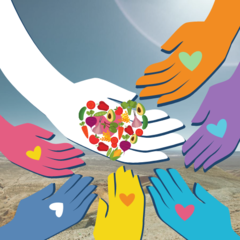ruby's d'var torah - parshat re'eh
08/11/2020 11:33:28 PM

The Torah refers to the five books of Moses, Genesis, Exodus, Leviticus, Numbers, and Deuteronomy. The five books of Moses tell a story, the story of the creation of the world, the story of the Jews breaking free from the Egyptians and wandering the desert for 40 years before coming back to Israel, their homeland. Each book consists of less than a dozen Torah Portions. My Torah Portion, Parashat Re’eh, is in the last book of the Torah, Deuteronomy. The Torah has been relating to society and our lives for thousands of years. That is one of the reasons why there are still so many people studying it. In my D’var Torah I will be talking about some of the ways my Torah portion relates to our society, and I will also shine light on the act of giving and being righteous for the impoverished people in the world.
Right before the Jews are about to enter the promised land Moses gives them many rules to abide by. It is said that there are 613 mitzvot or commandments in the entire Torah. Why was Moses giving the Jews all of these rules in the first place?
Parashat Re’eh takes place at the end of the Jews 40 year long trek through the desert. Moses was banished from the promised land so he must send the Jews on their way with instruction. He instructs the Israelites regarding idolatry (don’t do it!), false prophets (don’t believe them), clean foods (eat them) and unclean foods (stay away from them), freeing slaves (definitely a good idea), and the three pilgrimage festivals of Passover, Shavuot, and Sukkot, tithes (meaning, offering part of your crops to G-d, the priests, and those in need).
One of the rules he gave the Jews stood out to me: it was to always keep a portion of your food to the needy in your community, and to open your hand to those who have been widowed, and to the people living in poverty.
In Deuteronomy 15:11 Moses says to the Jews “For there will never cease to be needy ones in your land, which is why I command you: open your hand to the poor and needy kinsman in your land.” There are many Rabbis who wrote about their views of this quote. The medieval Rabbi known as the Rashbam says “for it is basically unrealistic to assume that society is 100 per cent righteous, or deserving.” Also meaning that you have to be righteous to have your necessities met. I feel that you don’t need to be righteous to have your basic needs met. I believe that everyone should have access to everyday essentials regardless of being righteous. Additionally, there are many people in the world who are wealthy and not righteous. You can’t just be righteous and get a lot of money. That would be kind of nice though.
As I said before, one of Moses’ rules was to always be giving to those in need This rule is what I based my Mitzvah Project on. Moses told the Israelites to keep a portion of their food and to give a portion of their farm to the people living in poverty.. Mitzvah means good deed, so a Mitzvah project is something that you organize to help a cause that you believe in. I chose to base my Mitzvah project on the hunger situation in Vermont, not only because it relates to my Torah portion, it is very significant now because of covid-19. There are many people struggling, now more than ever, to get food to themselves and their families, so I thought, what can I do to help? For my Mitzvah project, I decided to set up a fundraiser for the Vermont Food bank, a local organization that helps get food to the people who need it most. I also volunteered at a farm in Marshfield vt, it is a vegetable farm growing produce for migrant farm workers, and low income central vermonters.
Now you see how my Torah Portion relates to everyday society. There are still people living in poverty, so I feel that those who are able, should provide continued support and resources to them. Be righteous, give, and maybe even volunteer somewhere, not just because it makes you feel good, but because we all have the power to make a difference. We have the power, it's that simple, we just have to come together and utilize that power for the greater good. Thank you for listening to my D’var Torah, may you be inspired to give back to your community and to do an act of tikkun olam, repairing our world. Shabbat Shalom.
